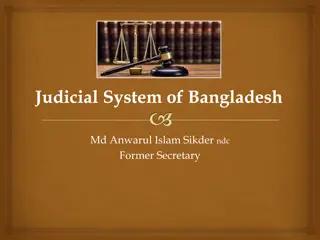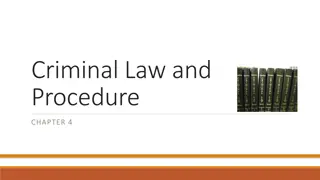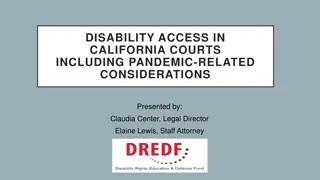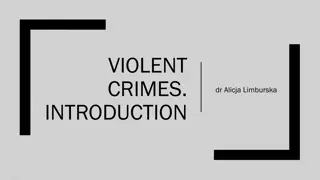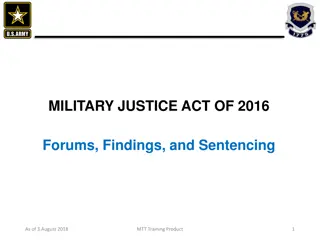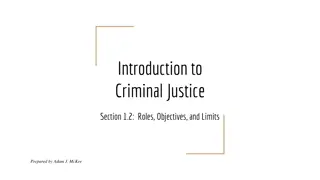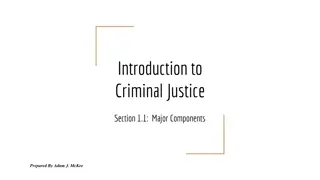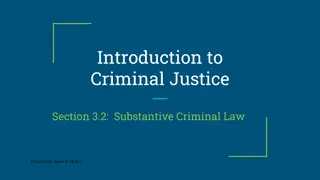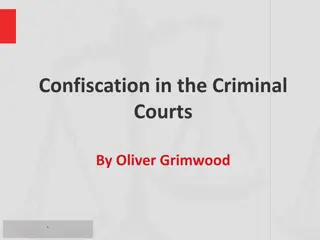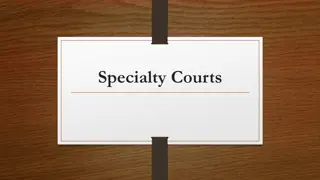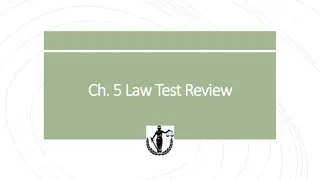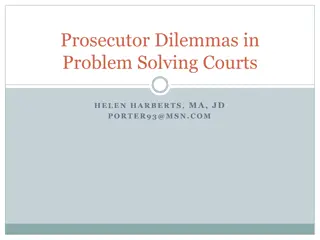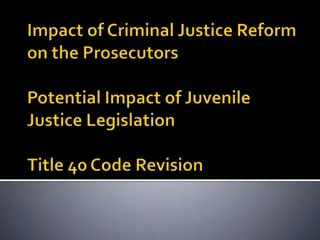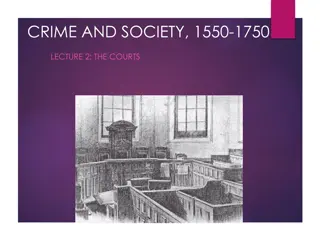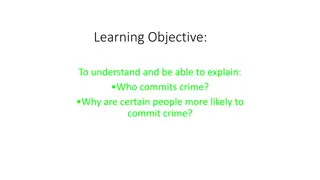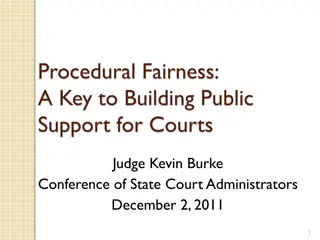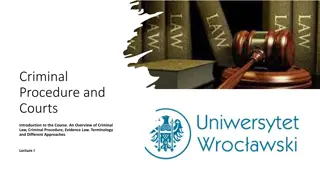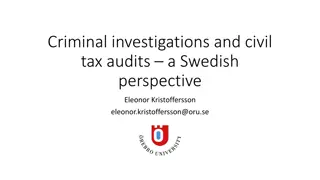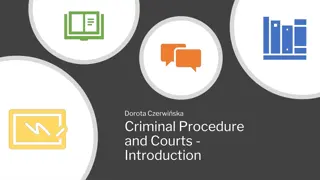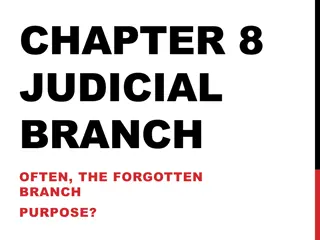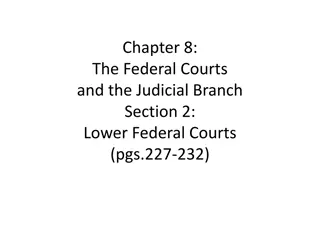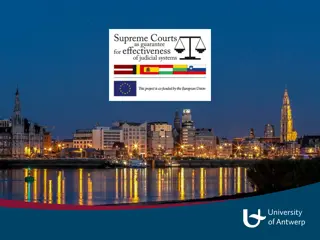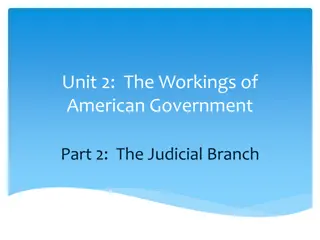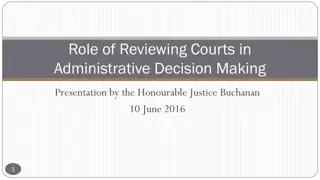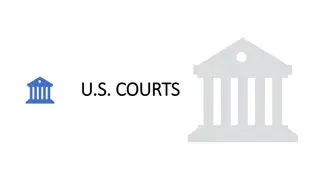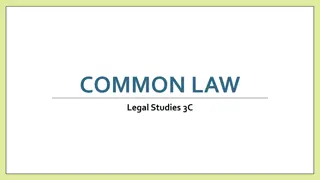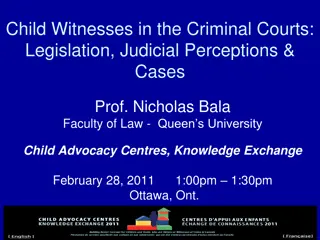Understanding the Judicial System of Bangladesh
The judicial system of Bangladesh is diverse, consisting of the Supreme Court, civil and criminal courts, courts of special jurisdiction, and more. The Constitution plays a vital role, outlining the structure and functions of the courts. From the Supreme Court to subordinate courts and tribunals, th
1 views • 37 slides
United Nations Survey on Crime Trends and Operations of Criminal Justice Systems
The United Nations Survey on Crime Trends and Operations of Criminal Justice Systems (UN-CTS) focuses on harmonizing data collection, identifying crime patterns, improving monitoring of the criminal justice system, and enhancing international comparability of crime statistics. It was mandated by the
3 views • 18 slides
JUDICIAL REVIEW OF NATIONAL ACTION BY UNCLOS COURTS AND TRIBUNALS
International judicial review involves oversight by international courts and tribunals over the actions of States Parties in implementing their international commitments. UNCLOS courts exercise supervisory jurisdiction through grounds of review like due regard, reasonableness, necessity, and proport
1 views • 7 slides
Understanding the Role of Town and Village Courts in Municipal Governance
Explore the historical significance and impact of Town and Village Courts on municipal boards, focusing on the balance between branches of government, the importance of Justice Courts to constituents, and tips for enhancing relationships between municipalities and justice courts.
0 views • 46 slides
Harmonisation of Substantive Criminal Law in the EU
The Treaty of Lisbon serves as a legal foundation for the harmonisation of substantive criminal law within the European Union. It establishes the basis for judicial cooperation, mutual recognition of judgments, and approximation of laws across Member States. The treaty allows for the establishment o
2 views • 60 slides
Understanding Criminal Behavior from a Social Psychological Perspective
This unit delves into the application of social psychology in the legal system, exploring the nature of criminal behavior, responses to criminal acts, the criminal justice system, and rehabilitation. It examines the social ecological perspective of criminal acts and outlines key points related to th
0 views • 50 slides
Understanding Psychological Theories of Criminal Behavior
Psychologically-based criminologists attribute criminal behavior to individual factors such as negative early childhood experiences and inadequate socialization, leading to criminal thinking patterns and incomplete cognitive development. Probation and parole practices are influenced by rehabilitatio
0 views • 30 slides
Understanding Criminal Law and Procedure: Greenvisor's Case
A case study involving embezzlement by Joe Greenvisor, the chief accountant of Nobreath Corporation, sheds light on criminal acts, duties, intent, and societal perspectives on crime. Despite Greenvisor's charitable intentions, his actions constituted a crime under the law. The elements of criminal a
0 views • 47 slides
Disability Access in California Courts: Pandemic Considerations and Legal History
This presentation on disability access in California courts, including pandemic-related considerations, covers relevant laws like Title II of the ADA and Section 504, historical developments such as the ADA enactment, and rules ensuring non-discrimination and accessibility in court proceedings. It a
0 views • 30 slides
Understanding Criminal Offences: A Comparative Analysis
Exploring the concept of criminal offences, this article delves into the definitions in common law and continental law systems. It discusses the structural elements, harmful nature, prohibition, punishment, and distinctive aspects of criminal acts. A comparison between common law and continental law
1 views • 33 slides
Ensuring Quality in Legal Translation by 3 Parties: Governments, Courts, and Translators
Explore the importance of quality legal translation involving governments, courts, and translators in criminal proceedings. The European Union's Directive on interpretation and translation aims to facilitate communication across Member States. Governments play a key role in regulating the translatio
0 views • 20 slides
Overview of Military Justice Act of 2016 and Court-Martial Proceedings
This comprehensive overview covers the Military Justice Act of 2016 and various aspects of court-martial proceedings, including different types of courts-martial, required votes for findings and sentencing, changes in special court-martial procedures, and more. The content delves into the specific c
0 views • 44 slides
Understanding the Process of Sealing Criminal Records
Having a criminal record sealed means making it inaccessible to the public while keeping it available to criminal justice agencies. Eligibility for sealing records requires taking action, and not everyone qualifies. This clinic provides guidance on the sealing process and the types of records that c
0 views • 36 slides
Understanding the Roles in Criminal Justice System
The criminal justice system involves three branches of government, each with specific responsibilities, operating at federal, state, and local levels. Law enforcement is primarily a local government function, while legislatures determine criminal laws and punishments. Statutes organized into codes d
0 views • 35 slides
Overview of Criminal Justice System Components in the United States
The criminal justice system in the United States comprises various systems at state and federal levels. It consists of major components - Police, Courts, Corrections - bound by the Rule of Law and the Constitution. The Courts interpret laws and uphold civil liberties, with remedies available for vio
0 views • 28 slides
Understanding Substantive Criminal Law in the American Legal System
Substantive criminal law encompasses the definition of criminal acts and penalties, with a core principle being that there can be no crime without a corresponding law. The American legal system follows the Rule of Law, ensuring that all individuals are subject to legal governance. Constitutional lim
0 views • 22 slides
Confiscation in the Criminal Courts: A Guide to Proceeds of Crime Law
Confiscation in the criminal courts involves depriving defendants of benefits gained from criminal conduct within their means. The Proceeds of Crime Law in the Cayman Islands sets guidelines for these proceedings, emphasizing that confiscation is not a form of punishment but aims to recover obtained
3 views • 17 slides
Cultural Awareness for Drug Courts Working with Native American Participants
Understanding the cultural nuances of Native American communities is crucial for Drug Courts collaborating with Tribal Healing to Wellness Courts. This involves acknowledging tribal sovereignty, regional and cultural differences, customs, spirituality, and communication styles unique to American Ind
0 views • 22 slides
Specialty Courts and Recidivism Rates in the United States
Specialty Courts, such as Drug Courts and Problem-Solving Courts, provide intensive behavioral supervision and treatment for substance abuse and mental health issues. These courts aim to reduce recidivism rates and engage criminal offenders in therapeutic interventions. Nevada is actively running 42
1 views • 14 slides
Understanding Jurisdiction and Court Systems: Law Test Review
Explore the concept of jurisdiction in the legal system, from the powers of courts to the different types of courts like admiralty and appellate courts. Learn about the structure of the federal courts in the U.S. and the functions of the Supreme Court. Gain insights into the specialized jurisdiction
2 views • 41 slides
Understanding the Judicial Branch of the Federal Government
The Judicial Branch, as the third branch of the federal government, ensures fair law enforcement and interprets laws through criminal and civil cases. Federal courts were established to address issues of state-based justice disparities. The judiciary system comprises district courts for trials, circ
1 views • 34 slides
Asset Recovery Practices in England and Wales: Criminal vs. Civil Proceedings
Asset recovery in England and Wales involves a combination of criminal and civil proceedings to secure justice and return funds to victims of crime. The CPS's Proceeds of Crime Division plays a crucial role in obtaining Restraint Orders and Confiscation Orders. Civil recovery, focusing on illicit fi
0 views • 11 slides
Challenges and Innovations in Problem-Solving Courts
Helen Harberts, a skilled MA and JD with expertise in problem-solving courts, delves into the dilemmas faced by prosecutors in these courts. Through in-depth insights and thought-provoking questions, the narrative explores the effectiveness of traditional responses to addiction-based offenses, publi
0 views • 65 slides
Impact of Criminal Justice Reforms on State Courts and Prosecutors
Changes in crime classifications and sentencing laws, along with the emphasis on Accountability Courts, are reshaping the criminal justice landscape in the state. Key changes include alterations to theft, burglary, and controlled substance laws, impacting the workload of state courts and prosecutors
0 views • 20 slides
Virtual Town Hall Monroe County Problem-Solving Courts: Stories and Statistics
Explore the Virtual Town Hall hosted by Viterbo University VOICE Initiative and Monroe County, focusing on Problem-Solving Courts. Learn about the initiatives, perspectives, and impacts of Drug Treatment Court, OWI Treatment Court, and Family Reunification Court. Gain insights from key figures like
0 views • 23 slides
Crime and Society, 1550-1750: Courts and Legal System Overview
The lecture covers the courts and legal system during the period of 1550-1750, focusing on the role of the monarch, Parliament, King's Bench, Court of Common Pleas, Assizes, Old Bailey, and local courts like Quarter Sessions. It highlights the hierarchy and functions of different courts in dealing w
0 views • 19 slides
Exploring the Factors Behind Criminal Behavior
Understanding who commits crime and why certain individuals are more likely to engage in criminal activities involves exploring a range of social and biological factors. While biology suggests a genetic predisposition to criminal behavior, sociology emphasizes the influence of social factors like fa
0 views • 9 slides
Understanding Public Perceptions of Courts and Judges
Exploring public opinions on procedural fairness in courts, this content discusses the influence of judges' political views, aspirations for higher courts on their impartiality, and the divided nation on interpreting the Constitution. It also highlights the complexities of public knowledge about the
0 views • 24 slides
Introduction to Criminal Procedure and Courts: Overview and Terminology
This piece provides an introduction to a course on Criminal Procedure and Courts, covering topics such as criminal law, evidence, courts, and international legal bodies. It outlines the exam format, information on lecturers, and essential knowledge needed for the course. Additionally, it shares insi
0 views • 28 slides
Understanding the Interaction Between Criminal Investigations and Civil Tax Audits in Sweden
The relationship between criminal investigations and civil tax audits in Sweden is explored, highlighting how tax audits and criminal proceedings run concurrently. The mens rea requirement for criminal sanctions and tax surcharge, as well as the integration between criminal sanctions and tax surchar
0 views • 13 slides
Fundamentals of Criminal Law and Procedure
Explore the key aspects of criminal law and procedure, including definitions of crime, the role of criminal procedure, sources of law, phases of the criminal process, participants involved, and rules of evidence in legal proceedings. Gain insight into how criminal law is distinct from civil law and
0 views • 24 slides
Understanding the Judicial Branch of the United States
The Judicial Branch, often overlooked, plays a crucial role in interpreting and applying laws fairly. It was established under Article 3 of the Constitution with the dual system separating state and federal courts. The Judiciary Act of 1789 proposed a three-tiered court system, including District Co
0 views • 31 slides
Understanding the Federal Court System in the United States
The Federal Court system in the United States comprises District Courts, handling a vast number of cases each year, with each district having multiple judges. These courts have jurisdiction over a range of cases, including civil rights violations, employment disputes, criminal offenses, and bankrupt
0 views • 11 slides
Role of Supreme Courts in Ensuring Effective Judicial Systems in the European Union
This communication focuses on the vital role of Supreme Courts in guaranteeing the effectiveness of judicial systems within the European Union. It delves into the significance of courts' communication strategies, emphasizing accessibility of justice, trust-building, and public image. The discussion
0 views • 29 slides
Overview of Courts and Legal System in Greece
The legal system in Greece is structured around ordinary and special courts, with judicial power vested in the courts of law. The system includes ordinary civil, criminal, and administrative courts, along with special courts for specific cases. The three jurisdictions - civil, criminal, and administ
0 views • 22 slides
The American Judicial Branch: Structure and Judicial Review
The American judicial system consists of District Courts, Appellate Courts, and the Supreme Court. District Courts handle initial cases, Appellate Courts hear appeals, and the Supreme Court is the highest authority. Justices are nominated by the President and confirmed by the Senate. Judicial review
0 views • 12 slides
Role of Reviewing Courts in Administrative Decision Making Presentation
The presentation by the Honourable Justice Buchanan on the role of reviewing courts in administrative decision-making highlights key legal cases and principles. It explores the delicate balance between judicial review and administrative decision-makers' discretion, emphasizing the importance of proc
1 views • 38 slides
Understanding the U.S. Court System: Jurisprudence and Structure
Law enforcement officers play a crucial role in the criminal justice system by understanding criminal jurisprudence and the court system's structure. This includes knowledge of different court levels, jurisdiction, and the adjudication process. The duality of courts, such as adult vs. juvenile court
0 views • 43 slides
Overview of Legal System in Australia
This content covers various aspects of the legal system in Australia, including common law, sources of law, court hierarchy, appeals process, federal courts, and the importance of judicial independence. It outlines the key components of the legal framework, such as the role of Parliament, judge-made
0 views • 36 slides
Child Witnesses in Criminal Courts: Legislation & Judicial Perceptions
Prof. Nicholas Bala discussed legislation and judicial perceptions regarding child witnesses in the criminal courts, focusing on Bill C-2 amendments, competency inquiries, the Canada Evidence Act, and survey findings on child competency. The presentation highlighted changes in the legal framework to
0 views • 38 slides
